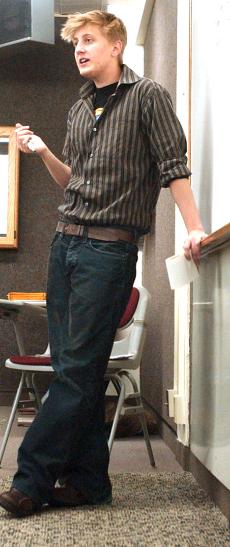LGBT performance targets transgender identity issues

Apr 5, 2006
Last updated on May 12, 2016 at 02:17 a.m.
The Main Lounge of Allen Hall will be filled with rhythmic storytelling, drag and rock ‘n’ roll tonight at 7:30. Transgender activist and performance artist Scott Turner Schofield, who has been visiting the University since Monday, will perform his work of spoken-word theater called “Underground TRANSit.”
Turner used “Underground TRANSit” as his honors thesis at Emory University in Atlanta. In the few years that have passed since he graduated, Turner has traveled the nation as a speaker and performer and was invited to the University for Lesbian, Gay, Bisexual, and Transgender Awareness Days.
“On this campus, the visibility of transgender people and the issues they face is low,” said Khristian Kemp-Delisser, assistant director of the Office of LGBT Concerns.
Transgender people face many obstacles just in daily life, from not being able to find the right bathroom to encountering difficulties with health coverage, Kemp-Delisser said.
Get The Daily Illini in your inbox!
“Underground TRANSit” portrays Turner’s journey in establishing his gender identity as a female-to-male transsexual.
“I identify as a transgender person as opposed to a man, because I have a woman’s history – I was almost homecoming queen,” Turner said.
The members of the LGBT staff are aware of a handful of transgender students and staff on campus, but none of them are openly transgender, Kemp-Delisser said. Transgender people are more common than most people realize, he said.
“The principal of my middle school had a sex change the summer I graduated,” said Sara Daleiden, freshman in LAS. “It was a big issue and affected the whole community.”
Daleiden said that her principal’s sex reassignment surgery made transgender issues seem more real to her. This is the type of change that Turner aims for in his performance.
“I want people to feel comfortable to come out and to listen and decide for themselves,” Turner said. “People make themselves (LGBT) allies by listening to my story and being changed by it. They can accept it, or at least learn about it and then decide if they want to accept it.”
Turner’s performance is not aimed at one particular group of people. In addition to LGBT groups, he does a lot of work with organizations such as sororities and fraternities.
“There’s a real dichotomy set up on college campuses where if you are LGBT, you think you can’t be in a Greek group because it’s diametrically opposed and unsafe for you to be there,” Turner said. “But of course, that’s untrue. We underestimate each other so much.”
Turner stressed that being gay or being Greek does not encompass everything that a person is. People have other stories and there are ways to connect with everybody, Turner said.
In a workshop Monday night, Turner addressed some common misconceptions about transgender people.
“Some people think that we’re freaks, or that all of us are actually straight, or that we’re all gay, and that we’re perverts- especially the male-to-female folks,” Turner said. “They think that a man wearing a dress must have some kind of sexual perversion.”
Turner also discussed the fear held by many who want to support transgender people. He said that because the issue of gender identity is so sensitive in our society, many would-be allies are afraid of making mistakes and causing offense.
“It’s all about taking risks, though,” Turner said. “I think that we all have to be more accepting when people are trying.”
Turner acknowledges that the issue of gender identity makes many people uneasy.
“It’s OK to be uncomfortable – it’s just not OK to take it out on other people,” Turner said. “Every month, at least one transwoman is murdered.”
Turner’s performance tonight concludes his stay at the University, and is free and open to the public.





